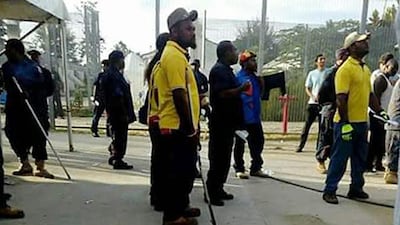Papua New Guinea police wielding metal batons on Friday cleared the last 320 men refusing to leave a shuttered Australian refugee camp, ending a 24-day standoff that put a global spotlight on Canberra's tough policy on asylum-seekers.
Videos and photos posted by the detainees showed police moving through the camp swinging long metal batons and pushing men towards buses bound for PNG-run centres elsewhere on Manus Island.
Photos showed men with scrapes and cuts that they said were from being hit and dragged by police, but no serious injuries were reported.
Several hours later, officials confirmed that the camp on a former PNG naval base had been emptied, as ordered by the country's supreme court in a ruling last year that found the Australia-run detention centre violated the constitution.
"It's empty. The military have taken back their base," PNG police spokesman Dominic Kakas said.
Australian immigration minister Peter Dutton accused refugees and their advocates of making "inaccurate and exaggerated claims of violence and injuries" during the police operation.
Canberra set up the Manus camp and a similar complex on the Pacific island nation of Nauru under a policy of "offshore detention" designed to stop the flow of migrants trying to reach Australia by boat.
The camps were described as "processing centres" where authorities would determine the legal status of detainees and then arrange resettlement for verified refugees.
But the resettlement policy stalled, with an agreement reached with former US president Barack Obama to take a number of the refugees put on hold when Donald Trump was elected a year ago. Only 24 refugees have moved to the United States.
About 600 men, most of them with refugee status, have been stuck on Manus since 2013.
Following the PNG court ruling, Australia declared Manus closed on October 31 and shut off supplies of food, water and electricity to the camp to force detainees to move to the PNG-managed "transition centres".
The refugees refused to move, fearing for their safety among a local population where many opposed their presence.
They also worried that, once no longer under Australian control, they would lose any leverage they had for obtaining resettlement in third countries.
Australian prime minister Malcolm Turnbull, in welcoming the end of the confrontation at Manus, stressed that the refugees were now under PNG authority.
"They're complying with the lawful directions of the PNG authorities and moving to the alternative facilities available to them and that's as they should," he said.
"That is precisely what you should do if you're in a foreign country, you should comply with the laws of that other country."
Mr Turnbull's government has faced international criticism during the standoff in Manus as conditions for the detainees deteriorated.
The UN refugee agency UNHCR expressed special concern when PNG police moved into the camp to force the remaining refugees to leave.
"UNHCR reminds Australia of its obligation to take full responsibility and provide effective protection, safety and lasting solutions for all refugees and asylum-seekers in cooperation with the Papua New Guinean authorities," the agency said on Thursday.
After Australia withdrew from the Manus camp, PNG police initially engaged in an effort dubbed "Helpim Friends" to entice refugees to move voluntarily to the new centres.
About 200 men complied, but 400 remained, leading to police raids on Thursday and Friday to forcibly clear the camp.
Amy Frew, a lawyer at the Australia-based Human Rights Law Centre, said the violent resolution of the standoff bode ill for the refugees' future.
"After four and a half years of limbo and uncertainty they still have nowhere safe to go," she said.
"This morning's actions show that whatever they do, wherever they go, their safety cannot be guaranteed until they are evacuated from Papua New Guinea."

